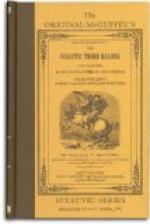II. SUMMER.
Now is the high tide of the year,
And whatever of life hath ebbed away
Comes flooding back with a ripply cheer,
Into every bare inlet and creek and bay.
We may shut our eyes, but we can not help knowing
That skies are clear and grass is growing;
The breeze comes whispering in our ear,
That dandelions are blossoming near,
That maize has sprouted, that streams are flowing,
That the river is bluer than the sky,
That the robin is plastering his house hard by;
And if the breeze kept the good news back
For other couriers we should not lack;
We could guess it all by yon heifer’s
lowing,—
And hark! how clear bold chanticleer,
Warmed with the new wine of the year,
Tells all in his lusty crowing.
—Lowell.
III. AUTUMN.
Thomas Hood, author of the following selection, was born in 1798, at London, where he was editor of the “London Magazine,” and died in 1845. He is best known as a humorist, but some of his poems are full of tender feeling.
The autumn is old;
The sear leaves are flying;
He hath gathered up gold
And now he is dying:
Old age, begin sighing!
The year’s in the wane;
There is nothing adorning;
The night has no eve,
And the day has no morning;
Cold winter gives warning.
IV. WINTER.
Charles T. Brooks translated the following selection from the original by the German poet, Ludwig Holty. Mr. Brooks was born at Salem, Mass., in 1813. After graduation at Harvard he entered the ministry. He translated much from the German, both of poetry and prose. He died in 1883.
Now no plumed throng
Charms the wood with song;
Icebound trees are glittering;
Merry snowbirds, twittering,
Fondly strive to cheer
Scenes so cold and drear.
Winter, still I see
Many charms in thee,
Love thy chilly greeting,
Snowstorms fiercely beating,
And the dear delights
Of the long, long nights.
LXXXV. BRANDYWINE FORD. (239)
Bayard Taylor was born at Kennett Square, Penn., in 1825. He received a limited school education, but at an early age displayed great energy and talent. He was a great traveler, and a fluent, graceful writer, both of prose and verse. Mr. Taylor held high official positions under the government. The following selection is adapted from “The Story of Kennett,” He died in 1878.
1. The black, dreary night, seemed interminable. He could only guess, here and there, at a landmark, and was forced to rely more upon Roger’s instinct of the road than upon the guidance of his senses. Toward midnight, as he judged, by the solitary crow of a cock, the rain almost entirely ceased.




